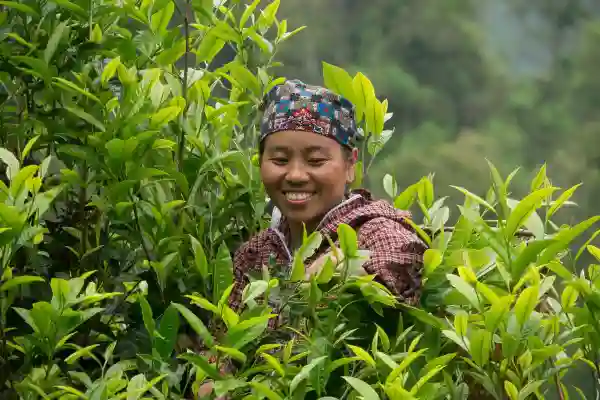

The unstoppable rise of matcha
What is matcha?
Matcha is a very special form of powdered green tea, which comes from the same plant as regular green and black tea, Camellia sinensis. There is a long history of matcha being used by monks to aid meditation. Green matcha tea was brought from China to Japan by a monk in the 12th century. Buddhist monks found that drinking this tea before their afternoon meditations enabled them to be more centered and focused. The traditional Japanese tea ceremony still centers on the preparation, serving and drinking of matcha as a ‘tea meditation’.
Why Matcha is considered ‘the king of green tea’?
The benefits of matcha green tea have recently become more well known in the West causing a rise in its popularity. It contains various compounds that are associated with supporting health, reducing stress and increasing alertness.
Still confused about what matcha tea is and how it is different from green tea?
Let's understand this with an example- green tea and matcha tea both contain a type of powerful plant compound, known as EGCG, which helps to wake you up, get the brain working faster and stay focused. But, the concentration of EGCG and other valuable antioxidants and nutrients is higher in matcha than green tea.
Does matcha contain caffeine?
There are quite rightly concerns about limiting caffeine intake for health reasons as high amounts can lead to jitteriness as well as difficulty falling asleep. However, research shows small to moderate amounts can also lift mood. Along with black and green tea, powdered green matcha tea does contain caffeine, but when comparing black tea vs matcha caffeine, the amount’s lower than black tea and coffee.
So, does matcha contain caffeine? The answer is yes, the caffeine in black, green and matcha tea is also balanced by the actions of another compound called L-theanine. This works with EGCG to balance the effect of caffeine in matchaand helps prevent the characteristic ‘crash’ associated with coffee. So matcha’s power benefits allow you to be dynamic whilst also developing a sense of inner peace. It’s the perfect brew for our over-stimulated busy world and great for caffeine lovers who are curious about what matcha tastes like and are keen on making a healthier switch.
Why not try our ‘Power your Morning’ meditation, along with a cup of Pukka tea with energising organic matcha tea, found in blends such as Supreme Matcha Green. You can sip the tea before, during and after your meditation, enjoying its warmth and aromas.
Why is matcha good for you?
Now that you know what matcha is, let's focus on some of its amazing health benefits (1):
Matcha is a natural energy booster and supports a healthy metabolism.
Matcha helps us feel more alert, enhancing memory and concentration. It also helps counter the effects of stress through its L-theanine content.
Matcha contains powerful ‘polyphenols’, a type of plant compound which supports health such as by protecting against free radical damage.
How we grow our highest quality matcha
The difference between organic matcha and green tea lies in the unusual cultivation and processing methods. Pukka matcha tea is derived from young green tea leaf tips. Plants are harvested at a young age and unnecessary fibres from the dried leaves are removed. The first step in processing matcha is to steam the leaves to prevent oxidation. This adds to the natural earthiness, mellow, and savory taste of matcha. For first-timers who are unaware of what matcha tastes like- it's bright, slightly bitter with subtle umami notes.
The final step in processing is to grind the leaves into a fine powder. Traditionally, this was done by hand in stone mills. Nowadays it is usually done by machine but our supplier in South Korea uses a stone vortex mill, to produce the highest quality powdered green tea matcha. So, what is matcha green tea in your mind? Why not try our Clean Green Matcha tea to make a delicious cold brew drink and experience the wholesome matcha tea benefits for your health and well-being.
Make mine an organic matcha
At Pukka we believe it is important to ensure your matcha and your green tea (and black teas for that matter) are organic. Every one of our teas is certified organic which means that no artificial chemicals or fertilisers are used in their production. This creates a matcha green tea which is not only better for you, but also better for biodiversity.
Dietz C, Dekker M, Piqueras-Fiszman B. (2017) An intervention study on the effect of matcha tea, in drink and snack bar formats, on mood and cognitive performance. Food Res Int. 99(Pt 1):72–83.

Author: Dr Vivien Rolfe
Head of Herbal Research
Viv is a gut physiologist and has recently achieved a Foundation in Herbal Medicine. She leads Pukka’s research programme to explore how herbs can benefit our health and be used to widen healthcare choices. This includes research into herbs for Women’s health and as alternatives to antibiotics. She establishes global research partnerships and enthuses the next generation of scientists through Pukka’s Scholarship Scheme. She is a champion of diversity in science and open access to knowledge.
Qualifications:
BSc, PhD, PFHEA
Years of experience:
30+ years in the wellbeing industry and academia
Education:
Degree in Physiology University of Sheffield, PhD University of Sheffield, Foundation in Herbalism Heartwood, MBA Entrepreneurship (on-going) Edinburgh Napier University, Principal Fellow of the Higher Education Academy.
Professional Registrations:
Membership of Nutrition Society, Physiological Society, Society for Chemical Industry, and other herbal and botanical groups.
